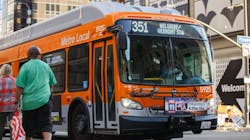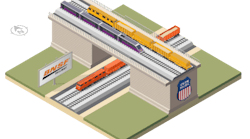CTC approves $2 billion in SB-1 funding including $433.6 million for transit projects
The California Transportation Commission (CTC) approved $2 billion in SB-1 discretionary funding for 56 projects throughout the state. SB-1 invests $54 billion over a 10-year period and passed in 2017. Half of the investment will be allocated toward local road, transit, pedestrian and cycle projects.
Of the 56 projects approved by CTC on Dec. 2 for funding, 10 are transit focused and total $433.6 million among three programs: the Solutions for Congested Corridors Program (SCCP), the Trade Corridor Enhancement Program (TCEP) and the Local Partnership Competitive Program (LPCP).
“These projects are going to benefit California in multiple important ways,” said CTC Chair Hilary Norton. “From an economic perspective, they will move people and goods more efficiently while creating over 100,000 jobs during one of the most difficult periods in our state’s history. From a climate perspective, they will move us toward a more inter-connected and multimodal transportation system that reduces greenhouse gas emissions by getting more people to take transit, walk or bike. This will be a game changer for transportation in California, especially as the state moves toward making travel on all of these modes cleaner.”
The CTC says the SCCP is designed to reduce congestion in highly traveled and highly congested corridors through performance improvements that balance transportation improvements, community impacts and provide environmental benefits. CTC approved $284.8 million in funding for transit projects in the SCCP, including:
- $65 million to the California Department of Transportation (Caltrans) and the San Bernardino County Transportation Authority (SBCTA) to deliver the West Valley Connector Bus Rapid Transit project, the first stage of SBCTA’s zero-emission bus initiative and the second bus rapid transit route.
- $60 million to Bay Area Rapid Transit for the Train Control Modernization on the TransBay Line that will replace the train control systems and update the train control power cables and interlock cables within the existing right-of-way, allowing BART to achieve shorter headways on the trunk line between Daly City and Downtown Oakland.
- $67 million to Caltrans for the Placer-Sacramento Gateway Corridor (PSGC) Phase 1 project, which is a package of multimodal improvements that include complete streets work, modernization of the SacRT Blue Line, an electric express bus route and light-rail station improvements, among other improvements.
- $92.8 million to Santa Cruz County Regional Transportation Commission for the Watsonville - Santa Cruz Multimodal Corridor Program (WSCMCP) Cycle 2 Project, which will include transit signal priority installation at 23 intersections, a portion of a hybrid bus-on-shoulder/auxiliary lane facility, highway and road improvements, as well as active transportation improvements.
The LPCP provides funding to counties, cities, districts and regional transportation agencies in which voters have approved fees or taxes dedicated solely to transportation improvements. This round of funding saw $48.8 million awarded to LPCP transit projects including:
- $2.8 million to the town of Windsor for the Windsor River Road and Windsor Road Intersection Improvement and Multi‐Use Pathway that will improve safety, functionality, throughput and provisions for new commuter rail service between Sonoma and Marin counties.
- $5.3 million to El Dorado County Department of Transportation for the Diamond Springs Parkway – Phase 1B multimodal project that will include bike lanes, sidewalk improvements and transit bus turnouts.
- $7 million to the San Diego Association of Governments for the Bike Up & Down in Uptown project that will construct protected bikeways, bike lanes, traffic calming measures, pedestrian connections, new crosswalks, bus stop upgrades, streetlights and roadway signage and striping.
- $25 million to the Los Angeles County Metropolitan Transportation Authority for the NextGen Bus Speed and Reliability Improvements, which will see all-door boarding, transit signal priority and bus priority lanes on high-frequency corridors in LA.
- $8.7 million to the San Francisco Municipal Transportation Agency for the Mission Street and Geneva Avenue Safety Improvements in San Francisco that will install new traffic signals, construct sidewalk extensions and bus stop improvements, perform streetscape improvements and commercial loading and curb management.
The TCEP funds infrastructure improvements on federally designated Trade Corridors of National and Regional Significance. While this program is dedicated to improving the movement of goods, a single project in this round of funding has impacts on passenger mobility. Caltrans and the San Joaquin Regional Rail Commission were awarded $100 million for the Stockton Diamond Grade Separation Project, which will construct a flyover that will eliminate a bottleneck at the state’s busiest, most congested at-grade railway junction.
The Stockton Diamond impacts the frequency, reliability and potential expansion opportunity of the Altamont Corridor Express and Amtrak® San Joaquins passenger rail services that operate on the same rail lines. Train backups also cause local travel delays at crossings and potential vehicle/rail/bike and pedestrian conflicts.
“This project is a critical step in unlocking freight and passenger rail mobility in Northern California,” said Vito Chiesa, chair of the San Joaquin Joint Powers Authority.
In addition to the transit specific awards, CTC also approved funding for several active transportation and complete streets projects that totaled $124.53 million with more than $65 million awarded under the SCCP and more than $59 million under TCEP.
CTC explains it received 130 applications requesting $3.7 billion, which is nearly double the available funding. Projects were evaluated based on transportation, economic, environmental impacts, as well other criteria established by legislation and through public workshops.

Mischa Wanek-Libman | Group Editorial Director
Mischa Wanek-Libman is director of communications with Transdev North America. She has more than 20 years of experience working in the transportation industry covering construction projects, engineering challenges, transit and rail operations and best practices.
Wanek-Libman has held top editorial positions at freight rail and public transportation business-to-business publications including as editor-in-chief and editorial director of Mass Transit from 2018-2024. She has been recognized for editorial excellence through her individual work, as well as for collaborative content.
She is an active member of the American Public Transportation Association's Marketing and Communications Committee and served 14 years as a Board Observer on the National Railroad Construction and Maintenance Association (NRC) Board of Directors.
She is a graduate of Drake University in Des Moines, Iowa, where she earned a Bachelor of Arts degree in Journalism and Mass Communication.


